Unit10 You're supposed to shake hands. Section B 1a — Self check课件(共54张PPT,内嵌音视频)人教新目标(Go for it)版九年
文档属性
| 名称 | Unit10 You're supposed to shake hands. Section B 1a — Self check课件(共54张PPT,内嵌音视频)人教新目标(Go for it)版九年 |  | |
| 格式 | pptx | ||
| 文件大小 | 24.6MB | ||
| 资源类型 | 教案 | ||
| 版本资源 | 人教新目标(Go for it)版 | ||
| 科目 | 英语 | ||
| 更新时间 | 2025-07-05 21:30:10 | ||
图片预览

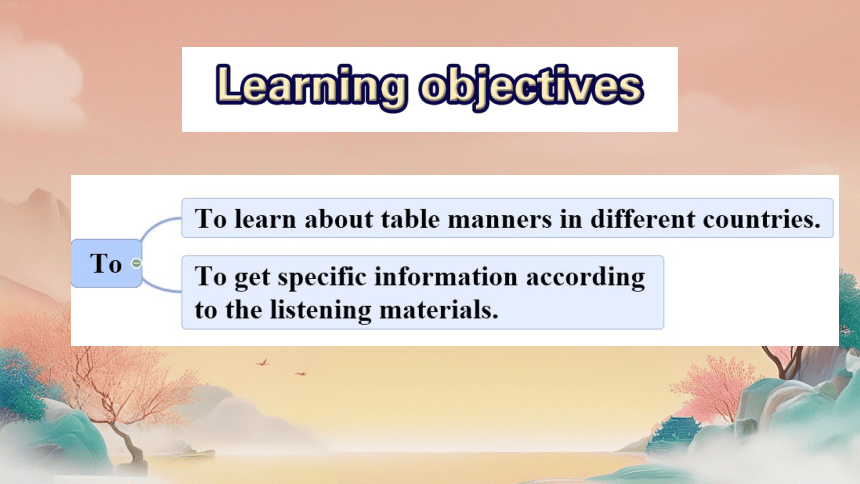
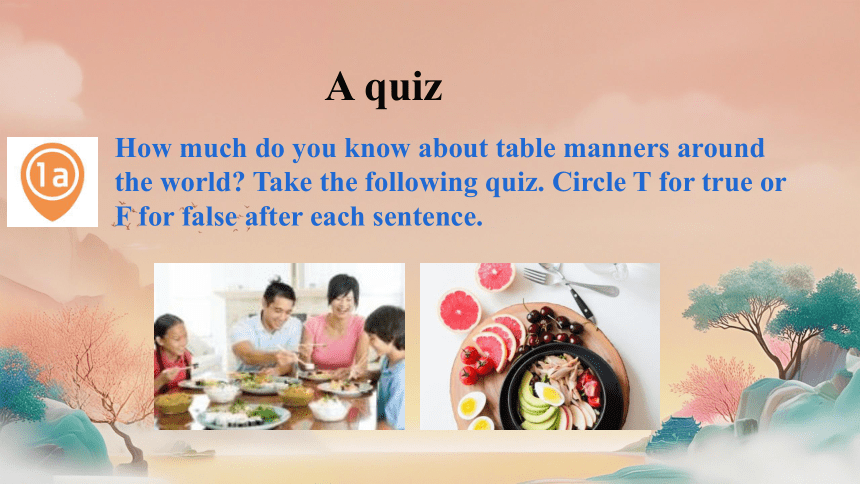
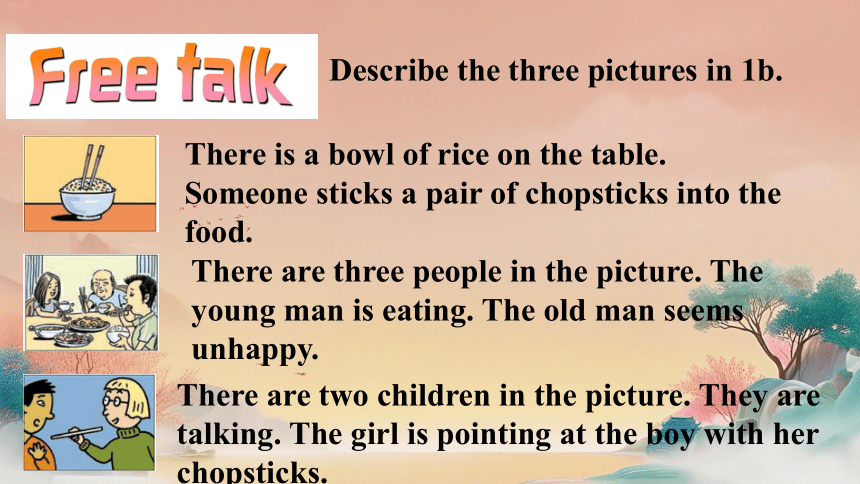
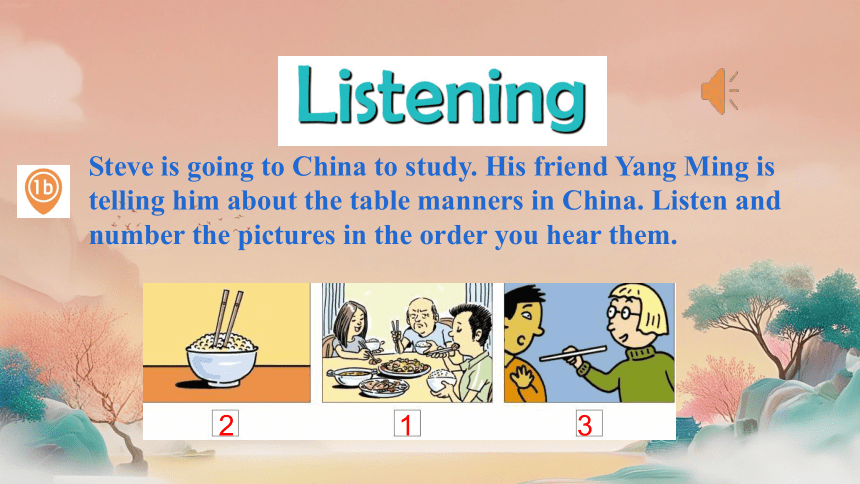
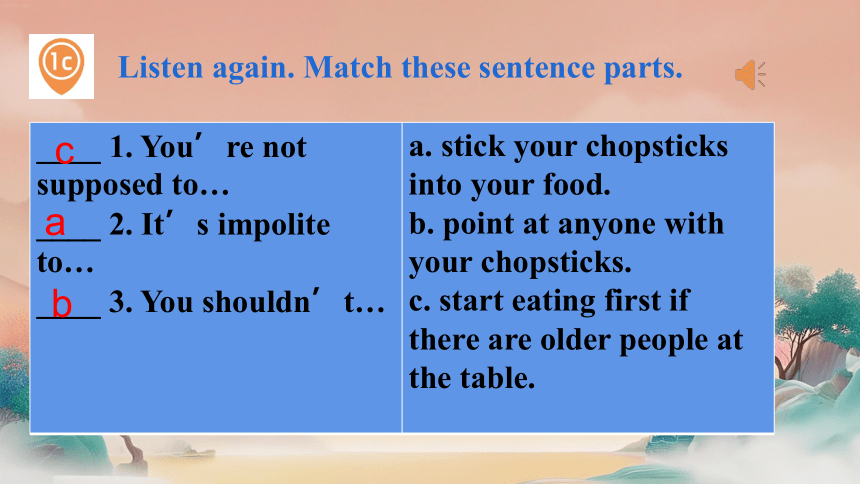
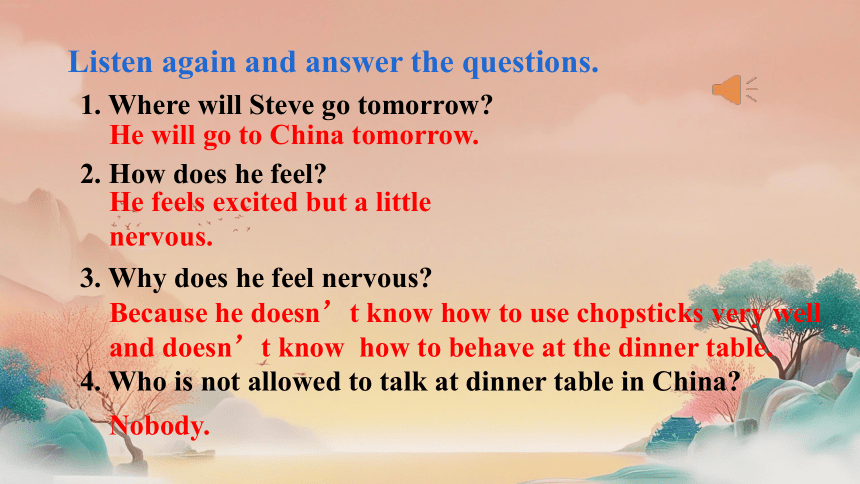
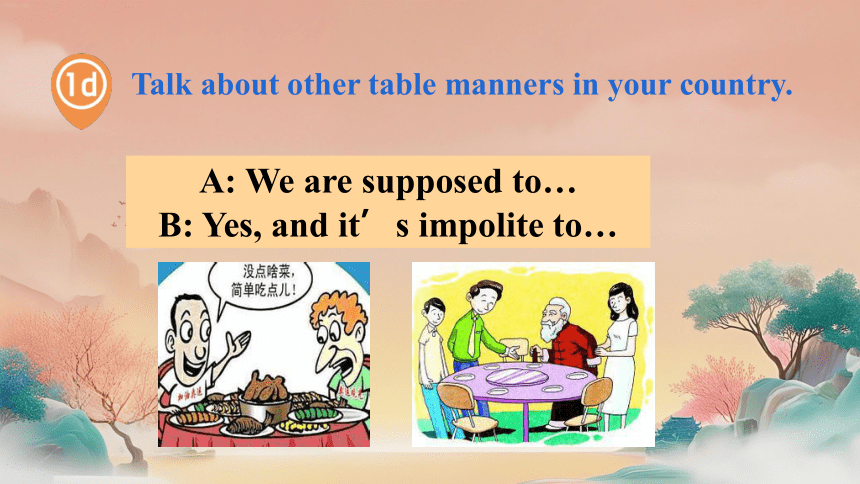
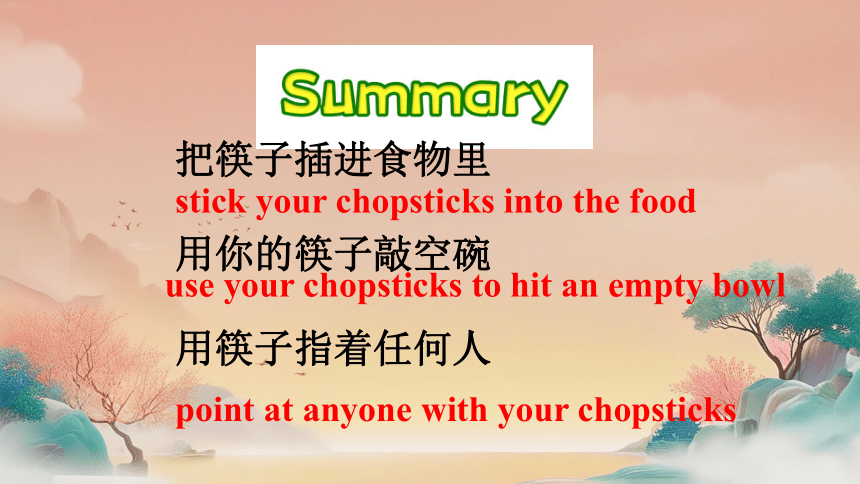


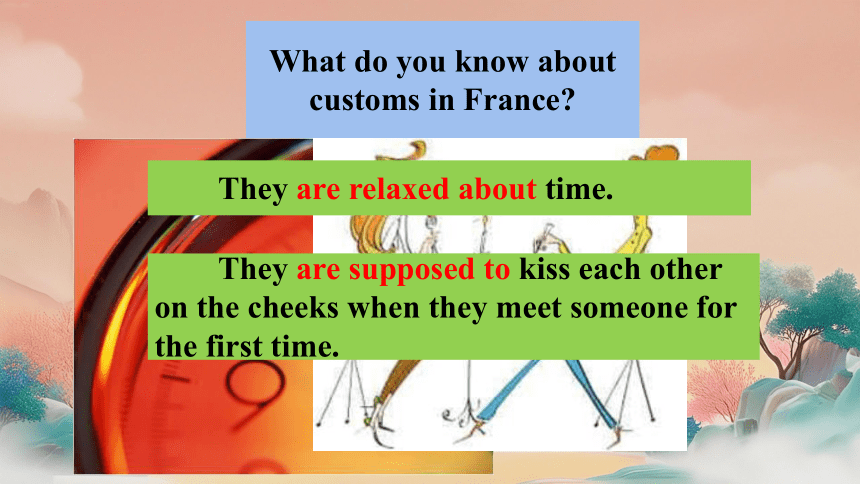
文档简介
(共54张PPT)
Unit 10
You're supposed to shake hands.
Section B 1a — Self check
A quiz
How much do you know about table manners around the world Take the following quiz. Circle T for true or F for false after each sentence.
Describe the three pictures in 1b.
There is a bowl of rice on the table.
Someone sticks a pair of chopsticks into the food.
There are three people in the picture. The young man is eating. The old man seems unhappy.
There are two children in the picture. They are talking. The girl is pointing at the boy with her chopsticks.
Steve is going to China to study. His friend Yang Ming is telling him about the table manners in China. Listen and number the pictures in the order you hear them.
2
1
3
Listen again. Match these sentence parts.
____ 1. You’re not supposed to… ____ 2. It’s impolite to… ____ 3. You shouldn’t… a. stick your chopsticks into your food.
b. point at anyone with your chopsticks.
c. start eating first if there are older people at the table.
c
a
b
Listen again and answer the questions.
1. Where will Steve go tomorrow
2. How does he feel
3. Why does he feel nervous
4. Who is not allowed to talk at dinner table in China
He will go to China tomorrow.
He feels excited but a little nervous.
Because he doesn’t know how to use chopsticks very well and doesn’t know how to behave at the dinner table.
Nobody.
Talk about other table manners in your country.
A: We are supposed to…
B: Yes, and it’s impolite to…
把筷子插进食物里
用你的筷子敲空碗
用筷子指着任何人
stick your chopsticks into the food
use your chopsticks to hit an empty bowl
point at anyone with your chopsticks
1. Find the differences in the table manners between France and China on the Internet.
2. Preview the reading passage on page 78.
Do you know where it is
What is this
The Eiffel Tower
What do you know about France
let 's enjoy the pictures!
What do you know about customs in France
They are supposed to kiss each other on the cheeks when they meet someone for the first time.
They are relaxed about time.
Mona Lisa smile
The capital of art
The capital of romance
Provence is the home of perfumery.
普罗旺斯是香水业的发源地。
Provence
Warming up
Do you know the table manners in France
In France, people are (not) supposed to…
×
People are supposed to eat with knife and fork.
People are supposed to put food on the plate.
×
elbows
×
In France, people are not supposed to…
In France, people are supposed to…
I am full.
It was delicious.
Before- reading :
1.Who is this letter from
2. What is this letter about (looking at the photo )
From Lin Yue.
Table manners.
阅读策略: 快速浏览找出每段的中心句。
1.What’s the topic sentence of paragraph 1
2.What is the topic sentence of paragraph 2
I am having a great time on my student exchange program in France.
My biggest challenge is learning how to behave at the dinner table.
Read paragraph 1 .
1. Why is Li Yue in France
She is an exchange student in France.
2. Does she enjoy staying with her host
family How do you know
Yes, she does.
1)Her host family is really nice.
2)They go out of their way to make her feel at home.
3)The grandmother makes Chinese food for her .
4)The granddaughter is kind and talks to her in French to give her practice.
Read paragraph 2.
3. How does she feel about making mistakes when she speaks French
4. What is the biggest challenge she is facing
It doesn’t worry her as it used to.
Her biggest challenge is how to behave at the dinner table.
Play a video about table manners in Western countries.
Review the passage and make notes about French customs in the chart.
2d
Dos(该做) Don’ts(不该做)
1.You’re expected to put your bread on the table.
2. You’re expected to cut up your fruit and eat it with a fork.
3. You’re expected to say “That was delicious” if you don’t want any more food.
1.You are not supposed to put your bread on your plate.
2) You are not supposed to eat anything with your hands except bread.
3) You’re not supposed to say you are full.
4) You are not supposed to put your elbows on the table.
第一段:
1.没理由做某事
2.想方设法地做某事
3.使某人感到宾至如归
4.十几岁的孙女
5.对做某事感到自在
6.犯错误
7.使某人担心
There’s no reason to do
go out of one’s way to do
make sb feel at home
teenage granddaughter
feel comfortable doing
make mistakes
worry sb
第二,三段:
1.在晚餐桌旁
2.正如你能想象的
3. 与…不同
4. 饱的
5. 习惯于某事
5. 发现…奇怪
6. 学年
at the dinner table
as you can imagine
be different from
be full
get used to sth
find sth strange
school year
Post reading
Read the sentences and replace the underline words with the phrases in the box.
2c
went out of their way
be comfortable doing
gradually gotten used to being
(something) worry (someone)
想方设法地
对做某事感到自在
逐渐适应
某事使某人担心
1. Making mistakes in French used to make Lin Yue nervous. 2. It was quite hard for her to feel good about speaking French. 3. The host family tried very hard to help Lin Yue. 4. Lin Yue has slowly learned how to be like her French friends. ● went out of their way
● be comfortable (doing)
● gradually gotten used to being
● (something) worry (someone)
Retell the passage
Lin Yue is her exchange program in France. Things are better than she___ it would be. Her host family . She has ____ in French. Her biggest challenge is learning how to behave at the dinner table. There are many strange in France. For example, you can put your bread on the table your plate. You aren’t supposed to eat anything with your hands except bread, not even fruit. You’re supposed to say “That was delicious.” instead of “I’m full.” You’re not supposed to put your hands___ your lap. You can put your , but not your ____ on the table. It’s difficult for her to remember everything, but she is gradually ____them.
1. Compare the table manners in France and China in your group. How are they the same or different Make a list.
2. Share your ideas with your class.
In France, people put their bread on the table. But in China, we…
Group work
Language points
1. They go out of their way to make me feel at home.他们想方设法地使我感到宾至如归。
1) 格外努力地做某事,想方设法地做某事: ____________________
e.g. 约翰总是想方设法使他的女朋友高兴。
John always____ ____ ____ _____ ____ ____his girl friend happy.
2) 使某人感到宾至如归: __________________
e.g.我在尽我一切所能使他们感到宾至 如归。
I’m doing everything I can to___ ____ ___ ___ ___.
go out of one’s way to do
goes out of his way to make
make sb feel at home
make them feel at home
2. You wouldn’t believe how quickly my French has improved because of that.
You wouldn’t believe +宾语从句… “你无法相信……;
= You would never believe…
= You would hardly believe…
eg:
1.你绝对无法相信他在台湾找到了失散多年的姐姐!
You ______ ______ _________he found his long-lost sister in Taiwan!
2. 你根本无法相信他取得了多大进步。
You _______ ______believe__________ much progress he’s made.
wouldn’t believe that
would never
how
3. My biggest challenge is learning how to behave at the dinner table.
我最大的挑战是学会怎样在餐桌上表现。
1)learning how to behave at the table是现在分词短语作表语。
eg:
a.他的主要爱好是钓鱼。
His main hobby is___________.
b. 最重要的事是及时到达那里。
The most important thing is _____ _____in time.
fishing
getting there
2) behave: 意为 “表现;行为”,
behavior : 行为,举止 ( un. )
表现好/糟糕”: behave ________ / _______
Eg:
a.如果你那样表现,你会让人厌恶的。
____ you _______ like that, you’ll get yourself disliked.
b. 如此的行为可能招致麻烦。
_____ _________ may cause trouble.
well
badly
If
behave
Such behavior
4. … but I’m gradually getting used to it.
习惯于: _________________
e.g.我们习惯了这种说话方式。
We______ _______ ______ this way of speaking.
① be/get used to sth./doing sth. 习惯于…
② used to do sth. 过去常常做某事(现在不做了)
e.g. 他习惯住在乡下。
He ______ _______ ________ _________ in the country.
他过去常常种植玫瑰。
He _______ _______ _________roses.
get used to sth/doing
get used to
gets used to living
used to plant
5. Another example is that you’re not supposed to eat anything with your hand except bread, not even fruit.
1) except作介词,意为“除……之外” (除去的部分不包括在内)
Everyone is here, __________Tom. Because he is ill.
2) besides 除去的部分包括在内,相当于“包括…在内”
He like many kinds of fruit. _____________apples, he also like bananas.
3) but,表 “除了”,常和all, no, nothing ,nobody 等不定代词连用。
当表示“除了…没有…” but 后需要接动词时,掌握规律:“有do,没to, 没do, 加to”
Eg: He can do nothing but _______ (wait). (有do,没to)
He has no choice but __________(wait). (没do, 加to)
except
Besides
wait
to wait
besides, except , but
1.He can speak two languages. ______ Chinese, he also can speak English.
2.He can do nothing ________ wait there.
3.Nobody can help you _____ yourself. Because only you can change yourself.
Besides
but
but
课堂检测:
( )1._______ you can imagine, most of us like playing the guitar after school.
A. At B. With C. For D. As
( )2. Everybody went to the party ______ Tom, because he was ill.
A. except B. besides C. beside D. but
( )3. He can do nothing _______ stay there waiting.
A. except B. besides C. beside D. but
( )4. He has no choice but ________ the order.
A.obey B. to obey C. obeying D. obyed
( )4. Children are supposed to behave _____ at the table .
A. bad B. good C. badly D. well
√
√
√
√
√
5.他总是想法设法地把英语学好。
He always _____ ______ ____ _____ ____ ______ learn English well.
6、我最大的挑战是习惯忙碌的生活。
My biggest challenge is ______ _______ _____ the busy life.
7. 你无法相信他学习有多么的努力。
You _______ _________ how hard he studies.
8.那个酒店的工作人员总是让我感觉宾至如归。
The staff in the hotel always ____ ____ ___ ____ ___.
goes out of his way to
getting used to
wouldn’t believe
make me feel at home
Table Manners
There are many table manners around the world, but different countries have different customs.
In India
eat with your hands.
In India, you are supposed to eat with your hands.
In the United States, you’re not supposed to eat with your hands.
3a Your pen pal is coming to China on an exchange program. He/She is asking you about Chinese customs and what he/she is supposed to do or not. Make notes in the chart.
Table manners It’s polite/impolite to…
House rules You’re supposed/not supposed to…
Going out with people You should…
2) Useful expressions:
有关文化礼仪的写作常用句型
You’re (not) supposed to….
You are expected to…
It’s polite/impolite to…
It’s important to…
You should….
Sample writing
Dear Tony,
You must be excited about coming to China soon. Let me give you some suggestions and advice about Chinese customs. When you are eating at the table, it’s impolite to stick your chopsticks into your food. You are not supposed to point at anyone with your chopsticks.
In our house, you’re supposed to shake hands with my father for the first time. You are not supposed to kiss when you meet my mother. You can say “nihao” to her with a big smile.
When you go out with people, you are expected to call first, it’s important to make plans to do something interesting or go somewhere together.
Chinese customs
Table manners
It’s polite to ask older people to start eating first at the table.
It’s not polite to pick up your bowl to eat.
You’re supposed to use chopsticks to eat.
It’s not polite to stick your chopsticks into your food.
写作训练
假如你是李菲,你的美国笔友Cindy 下周到中国来参观,她向你询问有关中国的礼仪,请你给她回一封e-mail,告诉她相关情况。内容包括:见面礼仪、餐桌礼仪等。词数:120词左右。开头已给出,不计词数。
Dear Cindy,
You must be excited about coming to China soon. It is helpful to learn as many of the customs in China as possible. These basic manners will help you enjoy staying in China.
First of all, let me give you some suggestions about visiting the Chinese people. When you meet the Chinese people for the first time, you are supposed to shake hands. You shouldn't kiss them. It's polite to smile and say hello to them. You should knock at the door before entering the room. And it's polite to do so. It's polite to call first if you want to visit your friend.
Then, it is helpful to learn as many of the table manners as possible. It's polite to wait till everyone is at the table. And you are not supposed to use your chopsticks to hit an empty bowl. You shouldn't stick the chopsticks into the food. It's very impolite to point at others with your chopsticks. It is also rude to speak with your mouth full. If you know the manners,I think you will enjoy yourself in China.
When you go to China, you'd better remember the saying: when in Rome, do as the Romans do.
Best wishes!
Yours
Li Fei
范文
How to keep a civilized city
Our city is a civilized city, we should try to keep it. As students, we should try to be civilized students. What should we do Firstly, it’s very important for us to know what to do and what not to do. In school, we should respect our teachers and classmates. We must go to school on time and we shouldn't be late for class. In class, we should listen to the teachers carefully. Secondly, we shouldn’t throw rubbish everywhere. We shouldn’t speak loudly in public. We shouldn’t smoke . It’s bad for you and others. Thirdly, we should be polite and friendly to others and offer help to a person in trouble. We should give our seats to the old and the kids on the bus. We should obey the traffic rules . Fourthly, we should have good life habits. We should exercise more. We should take a shower more often. In a word, if we follow all the rules, our city will be more beautiful.
Self Check
1. Fill in the blanks with the words in the box.
worth capital basic traffic
empty mad knocking
worth capital basic traffic
empty mad knocking
1. In many countries, it is impolite to show up at someone’s house for the first time with ______ hands. You should always bring a small gift.
2. Billy was very uncomfortable at a fine-dining restaurant last night because he didn’t know ______ table manners.
empty
basic
worth capital basic traffic
empty mad knocking
3. It is _______ spending the time to learn about the customs of a country before you go there. That way, you will know what you are supposed to do in different situations.
4. The ______ is always the worst in the ________ city. It is important to leave earlier if you are traveling by car.
worth
traffic
capital
worth capital basic traffic
empty mad knocking
5. Sandy went into her sister’s room without ___________ on the door. That made her sister ______.
knocking
mad
Think about your culture and make statements.
2
In my culture, when you ________________
you’re supposed to ___________________________
You’re not supposed to ___________________________
You’re expected to ______________________________
it’s impolite to _________________________________
it’s important to ________________________________
are having a meal in someone’s home.
allow the elder to start eating first.
stick your chopsticks into a bowl .
keep your mouth closed when you are chewing.
reach across the table to pick certain foods.
ask for permission to leave the table early.
Unit 10
You're supposed to shake hands.
Section B 1a — Self check
A quiz
How much do you know about table manners around the world Take the following quiz. Circle T for true or F for false after each sentence.
Describe the three pictures in 1b.
There is a bowl of rice on the table.
Someone sticks a pair of chopsticks into the food.
There are three people in the picture. The young man is eating. The old man seems unhappy.
There are two children in the picture. They are talking. The girl is pointing at the boy with her chopsticks.
Steve is going to China to study. His friend Yang Ming is telling him about the table manners in China. Listen and number the pictures in the order you hear them.
2
1
3
Listen again. Match these sentence parts.
____ 1. You’re not supposed to… ____ 2. It’s impolite to… ____ 3. You shouldn’t… a. stick your chopsticks into your food.
b. point at anyone with your chopsticks.
c. start eating first if there are older people at the table.
c
a
b
Listen again and answer the questions.
1. Where will Steve go tomorrow
2. How does he feel
3. Why does he feel nervous
4. Who is not allowed to talk at dinner table in China
He will go to China tomorrow.
He feels excited but a little nervous.
Because he doesn’t know how to use chopsticks very well and doesn’t know how to behave at the dinner table.
Nobody.
Talk about other table manners in your country.
A: We are supposed to…
B: Yes, and it’s impolite to…
把筷子插进食物里
用你的筷子敲空碗
用筷子指着任何人
stick your chopsticks into the food
use your chopsticks to hit an empty bowl
point at anyone with your chopsticks
1. Find the differences in the table manners between France and China on the Internet.
2. Preview the reading passage on page 78.
Do you know where it is
What is this
The Eiffel Tower
What do you know about France
let 's enjoy the pictures!
What do you know about customs in France
They are supposed to kiss each other on the cheeks when they meet someone for the first time.
They are relaxed about time.
Mona Lisa smile
The capital of art
The capital of romance
Provence is the home of perfumery.
普罗旺斯是香水业的发源地。
Provence
Warming up
Do you know the table manners in France
In France, people are (not) supposed to…
×
People are supposed to eat with knife and fork.
People are supposed to put food on the plate.
×
elbows
×
In France, people are not supposed to…
In France, people are supposed to…
I am full.
It was delicious.
Before- reading :
1.Who is this letter from
2. What is this letter about (looking at the photo )
From Lin Yue.
Table manners.
阅读策略: 快速浏览找出每段的中心句。
1.What’s the topic sentence of paragraph 1
2.What is the topic sentence of paragraph 2
I am having a great time on my student exchange program in France.
My biggest challenge is learning how to behave at the dinner table.
Read paragraph 1 .
1. Why is Li Yue in France
She is an exchange student in France.
2. Does she enjoy staying with her host
family How do you know
Yes, she does.
1)Her host family is really nice.
2)They go out of their way to make her feel at home.
3)The grandmother makes Chinese food for her .
4)The granddaughter is kind and talks to her in French to give her practice.
Read paragraph 2.
3. How does she feel about making mistakes when she speaks French
4. What is the biggest challenge she is facing
It doesn’t worry her as it used to.
Her biggest challenge is how to behave at the dinner table.
Play a video about table manners in Western countries.
Review the passage and make notes about French customs in the chart.
2d
Dos(该做) Don’ts(不该做)
1.You’re expected to put your bread on the table.
2. You’re expected to cut up your fruit and eat it with a fork.
3. You’re expected to say “That was delicious” if you don’t want any more food.
1.You are not supposed to put your bread on your plate.
2) You are not supposed to eat anything with your hands except bread.
3) You’re not supposed to say you are full.
4) You are not supposed to put your elbows on the table.
第一段:
1.没理由做某事
2.想方设法地做某事
3.使某人感到宾至如归
4.十几岁的孙女
5.对做某事感到自在
6.犯错误
7.使某人担心
There’s no reason to do
go out of one’s way to do
make sb feel at home
teenage granddaughter
feel comfortable doing
make mistakes
worry sb
第二,三段:
1.在晚餐桌旁
2.正如你能想象的
3. 与…不同
4. 饱的
5. 习惯于某事
5. 发现…奇怪
6. 学年
at the dinner table
as you can imagine
be different from
be full
get used to sth
find sth strange
school year
Post reading
Read the sentences and replace the underline words with the phrases in the box.
2c
went out of their way
be comfortable doing
gradually gotten used to being
(something) worry (someone)
想方设法地
对做某事感到自在
逐渐适应
某事使某人担心
1. Making mistakes in French used to make Lin Yue nervous. 2. It was quite hard for her to feel good about speaking French. 3. The host family tried very hard to help Lin Yue. 4. Lin Yue has slowly learned how to be like her French friends. ● went out of their way
● be comfortable (doing)
● gradually gotten used to being
● (something) worry (someone)
Retell the passage
Lin Yue is her exchange program in France. Things are better than she___ it would be. Her host family . She has ____ in French. Her biggest challenge is learning how to behave at the dinner table. There are many strange in France. For example, you can put your bread on the table your plate. You aren’t supposed to eat anything with your hands except bread, not even fruit. You’re supposed to say “That was delicious.” instead of “I’m full.” You’re not supposed to put your hands___ your lap. You can put your , but not your ____ on the table. It’s difficult for her to remember everything, but she is gradually ____them.
1. Compare the table manners in France and China in your group. How are they the same or different Make a list.
2. Share your ideas with your class.
In France, people put their bread on the table. But in China, we…
Group work
Language points
1. They go out of their way to make me feel at home.他们想方设法地使我感到宾至如归。
1) 格外努力地做某事,想方设法地做某事: ____________________
e.g. 约翰总是想方设法使他的女朋友高兴。
John always____ ____ ____ _____ ____ ____his girl friend happy.
2) 使某人感到宾至如归: __________________
e.g.我在尽我一切所能使他们感到宾至 如归。
I’m doing everything I can to___ ____ ___ ___ ___.
go out of one’s way to do
goes out of his way to make
make sb feel at home
make them feel at home
2. You wouldn’t believe how quickly my French has improved because of that.
You wouldn’t believe +宾语从句… “你无法相信……;
= You would never believe…
= You would hardly believe…
eg:
1.你绝对无法相信他在台湾找到了失散多年的姐姐!
You ______ ______ _________he found his long-lost sister in Taiwan!
2. 你根本无法相信他取得了多大进步。
You _______ ______believe__________ much progress he’s made.
wouldn’t believe that
would never
how
3. My biggest challenge is learning how to behave at the dinner table.
我最大的挑战是学会怎样在餐桌上表现。
1)learning how to behave at the table是现在分词短语作表语。
eg:
a.他的主要爱好是钓鱼。
His main hobby is___________.
b. 最重要的事是及时到达那里。
The most important thing is _____ _____in time.
fishing
getting there
2) behave: 意为 “表现;行为”,
behavior : 行为,举止 ( un. )
表现好/糟糕”: behave ________ / _______
Eg:
a.如果你那样表现,你会让人厌恶的。
____ you _______ like that, you’ll get yourself disliked.
b. 如此的行为可能招致麻烦。
_____ _________ may cause trouble.
well
badly
If
behave
Such behavior
4. … but I’m gradually getting used to it.
习惯于: _________________
e.g.我们习惯了这种说话方式。
We______ _______ ______ this way of speaking.
① be/get used to sth./doing sth. 习惯于…
② used to do sth. 过去常常做某事(现在不做了)
e.g. 他习惯住在乡下。
He ______ _______ ________ _________ in the country.
他过去常常种植玫瑰。
He _______ _______ _________roses.
get used to sth/doing
get used to
gets used to living
used to plant
5. Another example is that you’re not supposed to eat anything with your hand except bread, not even fruit.
1) except作介词,意为“除……之外” (除去的部分不包括在内)
Everyone is here, __________Tom. Because he is ill.
2) besides 除去的部分包括在内,相当于“包括…在内”
He like many kinds of fruit. _____________apples, he also like bananas.
3) but,表 “除了”,常和all, no, nothing ,nobody 等不定代词连用。
当表示“除了…没有…” but 后需要接动词时,掌握规律:“有do,没to, 没do, 加to”
Eg: He can do nothing but _______ (wait). (有do,没to)
He has no choice but __________(wait). (没do, 加to)
except
Besides
wait
to wait
besides, except , but
1.He can speak two languages. ______ Chinese, he also can speak English.
2.He can do nothing ________ wait there.
3.Nobody can help you _____ yourself. Because only you can change yourself.
Besides
but
but
课堂检测:
( )1._______ you can imagine, most of us like playing the guitar after school.
A. At B. With C. For D. As
( )2. Everybody went to the party ______ Tom, because he was ill.
A. except B. besides C. beside D. but
( )3. He can do nothing _______ stay there waiting.
A. except B. besides C. beside D. but
( )4. He has no choice but ________ the order.
A.obey B. to obey C. obeying D. obyed
( )4. Children are supposed to behave _____ at the table .
A. bad B. good C. badly D. well
√
√
√
√
√
5.他总是想法设法地把英语学好。
He always _____ ______ ____ _____ ____ ______ learn English well.
6、我最大的挑战是习惯忙碌的生活。
My biggest challenge is ______ _______ _____ the busy life.
7. 你无法相信他学习有多么的努力。
You _______ _________ how hard he studies.
8.那个酒店的工作人员总是让我感觉宾至如归。
The staff in the hotel always ____ ____ ___ ____ ___.
goes out of his way to
getting used to
wouldn’t believe
make me feel at home
Table Manners
There are many table manners around the world, but different countries have different customs.
In India
eat with your hands.
In India, you are supposed to eat with your hands.
In the United States, you’re not supposed to eat with your hands.
3a Your pen pal is coming to China on an exchange program. He/She is asking you about Chinese customs and what he/she is supposed to do or not. Make notes in the chart.
Table manners It’s polite/impolite to…
House rules You’re supposed/not supposed to…
Going out with people You should…
2) Useful expressions:
有关文化礼仪的写作常用句型
You’re (not) supposed to….
You are expected to…
It’s polite/impolite to…
It’s important to…
You should….
Sample writing
Dear Tony,
You must be excited about coming to China soon. Let me give you some suggestions and advice about Chinese customs. When you are eating at the table, it’s impolite to stick your chopsticks into your food. You are not supposed to point at anyone with your chopsticks.
In our house, you’re supposed to shake hands with my father for the first time. You are not supposed to kiss when you meet my mother. You can say “nihao” to her with a big smile.
When you go out with people, you are expected to call first, it’s important to make plans to do something interesting or go somewhere together.
Chinese customs
Table manners
It’s polite to ask older people to start eating first at the table.
It’s not polite to pick up your bowl to eat.
You’re supposed to use chopsticks to eat.
It’s not polite to stick your chopsticks into your food.
写作训练
假如你是李菲,你的美国笔友Cindy 下周到中国来参观,她向你询问有关中国的礼仪,请你给她回一封e-mail,告诉她相关情况。内容包括:见面礼仪、餐桌礼仪等。词数:120词左右。开头已给出,不计词数。
Dear Cindy,
You must be excited about coming to China soon. It is helpful to learn as many of the customs in China as possible. These basic manners will help you enjoy staying in China.
First of all, let me give you some suggestions about visiting the Chinese people. When you meet the Chinese people for the first time, you are supposed to shake hands. You shouldn't kiss them. It's polite to smile and say hello to them. You should knock at the door before entering the room. And it's polite to do so. It's polite to call first if you want to visit your friend.
Then, it is helpful to learn as many of the table manners as possible. It's polite to wait till everyone is at the table. And you are not supposed to use your chopsticks to hit an empty bowl. You shouldn't stick the chopsticks into the food. It's very impolite to point at others with your chopsticks. It is also rude to speak with your mouth full. If you know the manners,I think you will enjoy yourself in China.
When you go to China, you'd better remember the saying: when in Rome, do as the Romans do.
Best wishes!
Yours
Li Fei
范文
How to keep a civilized city
Our city is a civilized city, we should try to keep it. As students, we should try to be civilized students. What should we do Firstly, it’s very important for us to know what to do and what not to do. In school, we should respect our teachers and classmates. We must go to school on time and we shouldn't be late for class. In class, we should listen to the teachers carefully. Secondly, we shouldn’t throw rubbish everywhere. We shouldn’t speak loudly in public. We shouldn’t smoke . It’s bad for you and others. Thirdly, we should be polite and friendly to others and offer help to a person in trouble. We should give our seats to the old and the kids on the bus. We should obey the traffic rules . Fourthly, we should have good life habits. We should exercise more. We should take a shower more often. In a word, if we follow all the rules, our city will be more beautiful.
Self Check
1. Fill in the blanks with the words in the box.
worth capital basic traffic
empty mad knocking
worth capital basic traffic
empty mad knocking
1. In many countries, it is impolite to show up at someone’s house for the first time with ______ hands. You should always bring a small gift.
2. Billy was very uncomfortable at a fine-dining restaurant last night because he didn’t know ______ table manners.
empty
basic
worth capital basic traffic
empty mad knocking
3. It is _______ spending the time to learn about the customs of a country before you go there. That way, you will know what you are supposed to do in different situations.
4. The ______ is always the worst in the ________ city. It is important to leave earlier if you are traveling by car.
worth
traffic
capital
worth capital basic traffic
empty mad knocking
5. Sandy went into her sister’s room without ___________ on the door. That made her sister ______.
knocking
mad
Think about your culture and make statements.
2
In my culture, when you ________________
you’re supposed to ___________________________
You’re not supposed to ___________________________
You’re expected to ______________________________
it’s impolite to _________________________________
it’s important to ________________________________
are having a meal in someone’s home.
allow the elder to start eating first.
stick your chopsticks into a bowl .
keep your mouth closed when you are chewing.
reach across the table to pick certain foods.
ask for permission to leave the table early.
同课章节目录
- Unit 1 How can we become good learners.
- Section A
- Section B
- Unit 2 I think that mooncakes are delicious!
- Section A
- Section B
- Unit 3 Could you please tell me where the restroom
- Section A
- Section B
- Unit 4 I used to be afraid of the dark.
- Section A
- Section B
- Unit 5 What are the shirts made of?
- Section A
- Section B
- Review of Units 1-5
- Unit 6 When was it invented?
- Section A
- Section B
- Unit 7 Teenagers should be allowed to choose their
- Section A
- Section B
- Unit 8 It must belong to Carla.
- Section A
- Section B
- Unit 9 I like music that I can dance to.
- Section A
- Section B
- Unit 10 You're supposed to shake hands.
- Section A
- Section B
- Review of Units 6-10
- Unit 11 Sad movies make me cry.
- Section A
- Section B
- Unit 12 Life is full of the unexpected
- Section A
- Section B
- Unit 13 We're trying to save the earth!
- Section A
- Section B
- Unit 14 I remember meeting all of you in Grade 7.
- Section A
- Section B
- Review of Units 11-14
